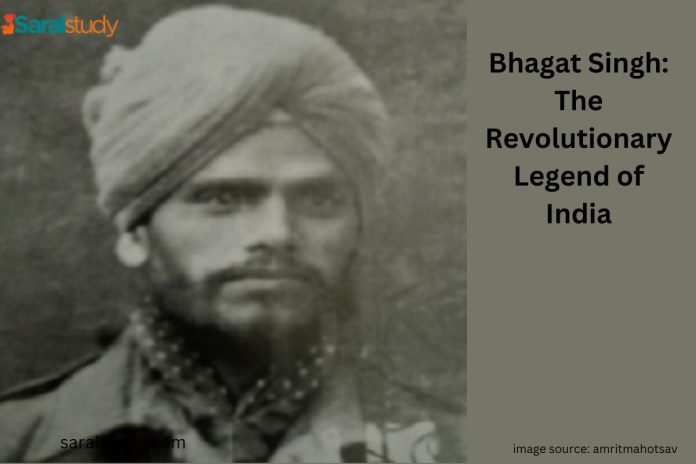Bhagat Singh is one of the most well-known freedom fighters of India. He is an inspiration to every Indian because he sacrificed his life in his fight against injustice and foreign occupation.
Early Life and Background of Bhagat Singh
Bhagat Singh was born into a Sikh family in Punjab on September 27, 1907. His family was deeply involved in the Indian freedom struggle. His grandfather was a notable reformist, and his father and uncle were members of the Ghadr Party, which aimed to free India from British rule. Growing up in such an environment, Bhagat Singh’s passion for India’s freedom ignited at an early age.
The Turning Point: Jallianwala Bagh Massacre
One of the significant turning points in Bhagat Singh’s life was the Jallianwala Bagh massacre. At the age of 14, he visited the site and collected blood-stained soil, keeping it as a memento for life. This event opened his eyes to the brutal injustices perpetrated by the British and solidified his resolve to dedicate his life to India’s freedom.
Joining the Revolutionary Movement
Bhagat Singh enrolled in the National College in Lahore, where he met Chandrasekhar Azad, BK Dutt, and other revolutionaries who shared similar goals. While in college, Bhagat Singh printed and distributed propaganda material to awaken the minds of other students and garner support for the freedom movement.
The Simon Commission Protest and Revenge
In 1928, the British Government in India appointed a commission under Sir John Simon to report on political developments. Since the commission consisted solely of Englishmen, Indian political parties decided to boycott it. During a peaceful protest against the Simon Commission, the British police brutally beat Lala Lajpat Rai, who later succumbed to his injuries. Bhagat Singh witnessed the attack and vowed to take revenge on James A. Scott, the police officer responsible. However, he mistakenly killed J.P. Saunders, a junior officer, and had to flee Lahore to escape the death penalty.
The Central Assembly Bombing
The British Government passed the Defense of India Act, giving the police more power to arrest anyone on suspicion of nationalist activities. In response, Bhagat Singh and Batukeshwar Dutt decided to throw a bomb in the Central Assembly to express their agitation. They carefully planned the attack to ensure no injuries and surrendered after throwing the bomb. While being arrested, Bhagat Singh shouted “Inquilab Zindabad” (Long Live the Revolution!).
Arrest, Trial, and Martyrdom
After his arrest, some of Bhagat Singh’s friends turned approvers, betraying him. Bhagat Singh was convicted and brought to court. During his trial, he openly admitted to killing Saunders and justified his actions. Despite his defence, the judge sentenced him to death. Bhagat Singh was hanged on March 23, 1931, at the age of 24.
Famous Quotes by Bhagat Singh
- “Inquilab Zindabad” (Long Live the Revolution!)
- “They may kill me, but they cannot kill my ideas. They can crush my body, but they will not be able to crush my spirit.”
- “It is easy to kill individuals, but you cannot kill the ideas. Great empires crumbled, while the ideas survived.”
Bhagat Singh’s Legacy
Bhagat Singh’s legacy continues to inspire generations of Indians. His courage, determination, and unwavering commitment to India’s freedom struggle have made him an enduring symbol of resistance against oppression. His life and sacrifice serve as a reminder of the power of youth and the impact of steadfast dedication to a cause.
Bhagat Singh’s story is not just about his revolutionary activities but also about his ideological depth and his belief in the power of ideas. His writings and speeches reflect his vision for a just and equitable society, free from colonial rule and social injustices.
Additional Facts about Shaheed Bhagat Singh:
- Bhagat Singh was deeply influenced by socialist ideologies and was an avid reader of revolutionary literature.
- He believed that the youth of the nation should be educated and politically aware to effectively contribute to the freedom struggle.
- Bhagat Singh’s hunger strike in jail to protest against the inhumane treatment of prisoners gained massive support and highlighted the plight of political prisoners under British rule.

